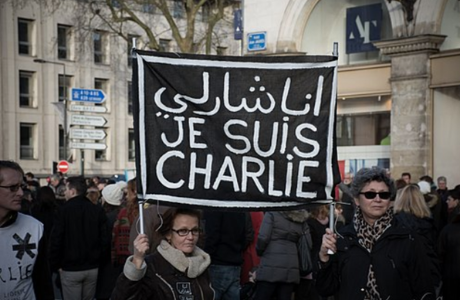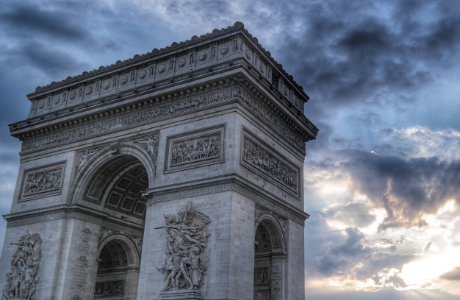In the light of the deadly terrorist attacks on Paris a few days ago, social media has been abuzz with various commentary on what has happened and why. To my surprise someone left a comment on my Facebook page that said, “Not all Muslims are terrorists, but all terrorists are Muslim.” I was stunned by the ignorance of the statement.
You see, I spent my early years in the UK and so I vividly remember the outbreak of terrorism in Northern Ireland in 1968. “The Troubles” lasted 30 years and, even when we moved to Australia in 1971, we frequently heard of atrocities caused by both sides – Catholic and Protestant Christians. As an atheist in my teenage years I would role my eyes at the fact that Christians were blowing each other up in Northern Ireland. It did nothing to endear me to the Gospel of Jesus. It wasn’t until I was converted to Christianity in the late 70s that I began to realise that just because someone called himself or herself a Christian, a Catholic or a Protestant, it didn’t mean they really were. The Irish terrorists may have aligned themselves with the Christian faith but they weren’t Christian.
Imagine how genuine Muslims feel right now that people bearing the name of their faith are blowing people up, beheading them and shooting them all in the name of Allah. Shouting Allahu Akbar (“God is greatest”) before blowing people up is no more Muslim than a Protestant or Catholic terrorist in Northern Ireland is Christian.
Since the attack by Islamic extremists on the World Trade Centre in 2001 there has been an increase of terrorism in the name of the Islamic faith, and this has been the focus of the media that I imagine led to the comment on Facebook about all terrorists being Muslim. But consider this:
“Christian” terrorism is still alive and well. The Army of God is a network of violent Christianists that has been active since the early 1980s and openly promotes killing abortion providers. The army of God also has a history of promoting violence against gays. Then there’s Eastern Lightning (the Church of the Almighty God or the Church of the Gospel’s Kingdom). They believe that the world is coming to an end, and in the meantime, its duty is to slay as many demons as possible. They have been responsible for a number of killings and kidnappings in China.
The mainstream media has had much to say about the Islamist brutality of Boko Haram (and rightly so), but one terrorist group they haven’t paid nearly as much attention to is the Lord’s Resistance Army (LRA)—which was founded by Joseph Kony (a radical Christianist) in Uganda in 1987 and has called for the establishment of a severe Christian fundamentalist government in that country. The LRA, according to Human Rights Watch, has committed thousands of killings and kidnappings spreading its terrorism from Uganda to parts of the Congo, the Central African Republic and South Sudan. The LRA’s tactics are not unlike those of ISIS or Boko Haram. And the governments Kony hopes to establish in Sub-Saharan Africa would implement a Christianist equivalent of Islamic Sharia law.
There’s the National Liberation Front of Tripura – a paramilitary Christianist movement that hopes to secede from India and establish a Christian fundamentalist government. It has zero tolerance for any religion other than Christianity, and the group has repeatedly shown a willingness to kill, kidnap or torture Hindus who refuse to be converted to its extreme brand of Protestant fundamentalism. There are other groups like The Phineas Priesthood and The Concerned Christians that true Christians should be concerned about.
Hindu nationalist groups in India far outweigh the damage caused by Islamist terrorists. In 2014 there were 976 deaths from terrorism in India. Islamist extremism claimed four lives. In the past decade, extremist Hindus have increased their attacks on Christians, until there are now several hundred per year.
Buddhist terrorist groups are playing a leading role in the rising tide of religious extremism in their respective countries and have been active in promoting the violent ideology that has led to hundreds of deaths in Sri Lanka and genocide in the western Rakhine state of Myanmar. In Australia some of our “boat people” have been a Muslim minority from Myanmar, the Rohingya people. None of Myanmar’s ethnic minorities have escaped persecution from the country’s Burman majority government over the years – be they Christian, Animist, Muslim or Buddhist.
Right now seven of the top ten terrorist groups are Islamic extremists. We have a problem that doesn’t seem like it will go away for years if not decades. Islam has a problem too and it’s my opinion that Muslim leaders – and Muslim people in general – need to be much more vocal in decrying acts of terrorism. But while I hear a lot of Christians condemning Islamic extremism I haven’t heard anything from the church denouncing Christian terrorism when it raises its ugly head. The silence is deafening!
What we need is for all good people – regardless of their faith or absence of a faith – speaking out against injustice wherever it is and whoever perpetrates it. Let us pray for Paris, but let’s not forget the people of other cities and nations that are affected by terrorism every single day. Consider this, over 200,000 people have died in Syria in the past 4.5 years. That’s equivalent to a Paris attack EVERY DAY! Why don’t we see Facebook profile pictures depicting the Syrian flag? Are we praying for them too or are we sitting back making ignorant judgments like, “all terrorists are Muslim.”




